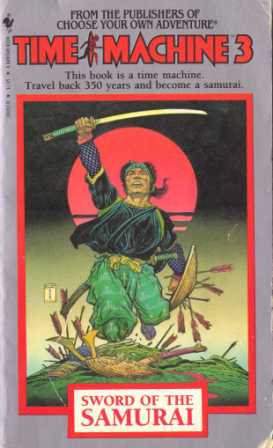January 2nd, 2011
The World’s Oldest Form of Time Travel — A Book

I’ll never forget the time I traveled back in time 350 years and met Miyamoto Musashi. I mean, wouldn’t you?
Okay, I recognize the above-written statement needs some explaining so let me just say that I neither own a DeLorean nor have I ever been committed to a mental health facility for extended psychiatric evaluation. All I did was read a book — imagine that? Now this text may not be a classic of children’s literature, but it was one that I look back on as a real gateway to an interest in reading, science fiction, and Japanese culture, not to mention the book’s status as a text that helped shape my moral compass at such a very early age.
The book I am talking about is Sword of the Samurai, which was the third volume of the Time Machine series. The name may not ring any bells, but I’m betting you probably at least heard of its biggest competitor, Choose Your Own Adventure. Like its more popular predecessor, Time Machine allowed the reader to choose his or her next move. Written in the second-person point of view, the books give you a choice at the end of a chapter. In the case of Sword of the Samurai, the choice might be as simple as this:
*Warn Musashi. Turn to Page 84.
*Say Nothing. Turn to Page 81
Written by Michael Reeves and Steve Perry (the sci-fi author, not the lead singer of Journey) with some illustrations by Marvel and DC Comics artist, Steve Leialoha, Sword of the Samurai was my first introduction to not only Japanese — specifically samurai — culture, but also to the “rules of time travel” — not changing the past or killing anyone, et al. Aside from a really fun story (as I remember it anyway), the book also had some historically accurate stuff about the time period, the language, and Musashi himself. And I’ll never forget that ending.
SPOILER ALERT if you’re interested in reading it for yourself.
At the end of the book, you finally track down the great swordsman Miyamoto Musashi at the end of his life after crossing paths with him several times in the novel. Your goal is to take a katana from him back to the present day, as no known swords of his have survived to the present era. In what is the penultimate chapter, you and Musashi hit it off pretty well and he basically, but not explicitly says you can take his sword. And then he up and dies.
The book then gives you a choice — you can either take one of his swords or you can just walk away. Maybe this is a no-brainer for an adult, but for a kid of about seven or eight years of age, this felt like a monumental decision as I was totally absorbed in the story. Without cheating, I decided that it would be wrong to take it, as I’d be practically a graverobber. Lo and behold, it turned out to be the right choice. It turns out ol’ Musashi was just joshin’ around. He ain’t dead; he was just testing your honor. Passing his little honor quiz, Musashi gives you the most precious sword of his — a wooden one — for you to take back to your time period. Mission accomplished.
If you choose to take the sword from a “dead” Musashi, he wakes up and tries to kill you, hurling you all the way through time back to the beginning of your adventure — i.e. page one. Yikes.
After recently posting about the perils of “instant gratification” in today’s geek culture, I have to say that finding this book is actually one of the benefits. I mean, I’m pretty happy about the fact that I could pick up a mint copy of this book, which was published in the early 1980s for about $3 on Amazon.
If not for this book, maybe I’d still have gotten interested in Kurosawa, Sanjuro, and the like, but I don’t think it would have happened for a very long time. For me, this will always be the book that opened up a whole new world to me — to a culture, to a genre, to an enduring film history. If I have time in the next month, I’ll reread the book and see if my memory of it matches how it reads for me today. A cursory glance at a few of the pages suggests that it won’t be a disappointment.

